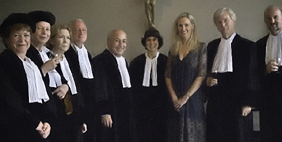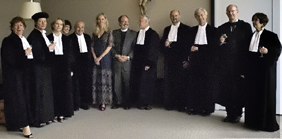Susan Kay Riva-Mossman
DISSERTATION TITLE:
Conflict Narratives: Mediation Case Studies in an Intercultural Context
The Narrative Model in mediation provides a theoretical framework that can be used to better understand the relevance of intercultural case studies in mediation that tookplace in Valais, Switzerland between 2001 and 2008. This process-oriented model distinguishes itself from more classical problem-solving models in mediation. The descriptions presented in the conflict narratives analyze and reflect upon the performative, relational, and dialogical nature of the transformative processes inherent in the narrative mediation model.
The narrative approach to mediation was developed using Arthur Kleinman’s Explanatory Model to gather the “conflict narratives” from the political asylum seekers that participated in mediation at the Canton’s mediation service. Other intercultural mediations are presented using the lens of anthropology to deconstruct the case studies. Social Constructionist theory then provides a theoretical framework to reconstruct or “restory” the conflict narratives. The different methodologies were phases in a grounded theory approach allowing for new theories to emerge in a field of mediation where no prior research in this specific area existed. The Narrative Model in Mediation, based on social constructionist theory, demonstrates that mediation and mediators are not neutral. So therefore, the practice of mediation in this political context is itself a social action. The evidence presented through the descriptions in the case studies, participatory observation, and interviews may suggest that the mediation process socially constructed an interdisciplinary approach to conflict resolution within the organization, the institutions that participated in the mediation process, and the social and health network in the Valais.
My hypothesis is that mediation is a social practice that is a transformative social action affecting power relations by creating a legitimate space for multiple voices and perspectives to be heard and listened to. This creative social dialogue constructs positive solutions by utilizing the resources of all the participants within the mediation process. When the mediator is recognized as an active transformer of narratives and not an expert, the educational and transformational dimensions of the mediation process are accentuated, socially constructing the emergence of solutions that traditional problem-solving models in mediation could possibly restrict.


